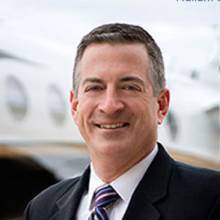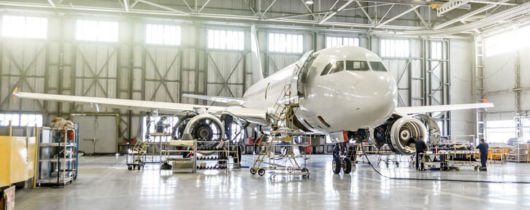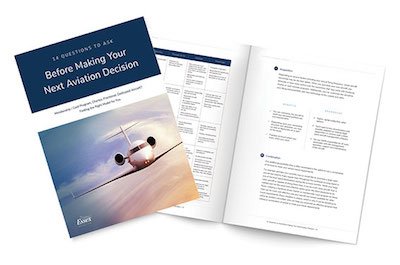
Trusts, which are fiduciary arrangements that enable a third party (trustee) to hold assets on behalf of a beneficiary (trustor), are often used for estate planning, property transfer, asset preservation and so on. Trusts are also important in the private aviation industry, where they’re commonly used as an ownership structure, to meet the necessary requirements to register an aircraft on the United States Federal Aviation Administration Aircraft Registry and to increase ownership privacy.
This article — written in partnership with the aircraft trust experts at TVPX Trust Services — will answer some of the most common questions about aircraft trusts and how they work.
What Is an Aircraft Trust?
Structurally, an aircraft trust is no different than any other form of trust, in that it involves a trustee holding an asset — in this case, a private aircraft — on behalf of a trustor. And similar to other trusts, an aircraft trust can help a trustor protect the value of their asset, increase ownership privacy and reduce paperwork. However, aircraft trusts (also known as owner trusts) are most commonly used to register aircraft in the United States, which we’ll talk about in greater detail in the next section.
What Are the Benefits of Establishing an Aircraft Trust?
The Federal Aviation Administration (FAA) requires that all aircraft in the FAA Aircraft Registry be registered in the owner’s name. This is different from other registries, which allow for aircraft to be registered in the operator’s name. The FAA also has strict citizenship requirements that impact an aircraft’s registration eligibility.
Based on these requirements, an aircraft is eligible for U.S. registration if it is not registered in another country and is owned by:
- An individual who is a U.S. citizen
- A partnership, in which each partner is a U.S. citizen
- A corporation or association:
- Organized under the laws of the U.S. or a State, the District of Columbia, or a U.S. territory or possession,
- Of which the president and at least two-thirds of the board of directors and other managing officers are U.S. citizens, and
- In which at least 75% of the voting interest is owned or controlled by U.S. citizens.
- An individual citizen of a foreign country lawfully admitted for permanent residence in the U.S.
- A U.S. governmental unit or subdivision
- A non-U.S. citizen corporation organized and doing business under the laws of the U.S. or one of the States, as long as the aircraft is based and primarily used in the U.S. (60% of all flight hours must be from flights starting and ending within the U.S.)
If an owner does not satisfy the FAA’s citizenship requirements, they can still register their aircraft in the U.S. by establishing a trust with a trustee that is recognized as a U.S. citizen.
For many owners, the decision to place their aircraft in a trust is about protecting their investment. In addition to its citizenship requirements, the FAA also has stringent safety requirements and maintenance standards — requirements and standards that are recognized, respected and replicated by many registries around the world.
Prospective buyers based in the U.S. — which is one of the largest aircraft markets in the world and home to some of the world’s leading business aircraft manufacturers — will want proof that any assets they consider purchasing have been maintained according to these standards. By registering their aircraft with the FAA, sellers can demonstrate that their aircraft meets these internationally accepted standards, thereby enabling them to secure a higher resale value and allowing for an easier transfer of ownership.
The final reason why an owner might consider establishing an aircraft trust is to protect their privacy. Basic FAA Aircraft Registry information is available on the FAA website, meaning anyone can access information about the registered owner of an aircraft and even track that aircraft’s movements. The availability of this information can compromise an owner’s privacy and safety and, in the case of corporations that own business aircraft, introduce competitive risk. Although the FAA’s Limiting Aircraft Data Displayed program is designed to mitigate these risks, forming an aircraft trust builds in an additional layer of protection by registering the aircraft under the trustee’s name.
How Does an Aircraft Trust Work?
As with any other form of trust, an aircraft trust involves two primary parties: the trustor, who is the beneficiary of the trust, and the trustee, who is responsible for handling the trustor’s asset. In most cases, the trustee is a professional organization or company that specializes in delivering aircraft trust services.
Although the trustee holds the legal title to the aircraft and the aircraft is registered with the FAA in the trustee’s name, the trustor is the sole beneficiary of the trust and the true owner of the asset. This means that the trustee cannot sell the aircraft without the beneficiary’s permission. The trustor can also instruct the trustee to transfer the legal title to any party of their choosing and reserves the right to dissolve the trust at any time, for any reason.
What Are the Different Types of Aircraft Trusts?
There are two primary types of aircraft trusts: short-term trusts and long-term trusts.
Short-term aircraft trusts — trusts put in place for a specified, often short period of time — are commonly used by foreign buyers during cross-border transactions. For example, let’s say that a buyer located in the U.K. purchased an aircraft based in the U.S. Now, let’s say that that buyer wanted to permanently base and register their new aircraft in their home country. That buyer might establish a short-term trust to register the aircraft in the U.S., transport it to the U.K. and then re-register the aircraft in the U.K., at which point they would dissolve the trust.
Long-term trusts are aircraft trusts that extend for an indefinite period of time. They are more common amongst owners who want to keep their aircraft for longer than a few months and register it with the FAA, but do not meet the FAA’s citizenship requirements.
There are also privacy trusts and voting trusts, both of which can be short-term or long-term.
A privacy trust is exactly what it sounds like: a trust established to protect the owner’s privacy. By registering their aircraft in a trustee’s name, rather than their own — even if they do meet the FAA’s citizenship requirements — an owner can help prevent their personal information from being made available to the public, while still adhering to FAA requirements.
It’s important to note that although a privacy trust prevents members of the public from seeing the true owner of the aircraft in the FAA Aircraft Registry records, the federal government still has access to that information and complete oversight. The government can, therefore, ensure that the aircraft is maintained and operated according to FAA standards. In this arrangement, trustees are also required to present additional information about the aircraft and its true owner at the FAA’s request.
Finally, a voting trust is a form of aircraft trust in which one or more shareholders who do not meet the FAA’s citizenship requirements transfer their voting rights, or share of the aircraft, to a trustee. Voting trusts, which come with more requirements than other types of aircraft trusts, are not as common as owner trusts, since they afford less flexibility.
Who Is Eligible to Establish an Aircraft Trust?
There are no eligibility requirements for an aircraft trust. Any private aircraft owner, whether they are an individual or a corporation, has the option to enter into a trust agreement.
How Do Aircraft Trusts Affect Taxation?
Aircraft trusts are considered pass-through entities for tax purposes. That means that the true owner of the aircraft — the trustor — is responsible for paying taxes on their asset. To that end, it’s important that the trustor be aware of local tax requirements in the jurisdiction where the aircraft was acquired and in whichever jurisdiction(s) their aircraft is based and operated. Aircraft trusts are also tax-neutral, which means they have no impact, either positive or negative, on a trustor’s tax situation.
How Do Aircraft Trusts Affect Utilization?
In terms of utilization, the trustor and the trustee will work together to create an operating or lease agreement that transfers operational control of the aircraft either back to its true owner, or to a designated third-party operator. The operator is then responsible for ensuring that the aircraft is insured, maintained and operated according to FAA standards.
Can You Borrow Against an Aircraft Held in a Trust?
There are no obstacles to financing an aircraft that’s held in an aircraft trust. Lenders are interested in the security interest on the mortgage for an aircraft, which is granted by the trustee who holds the legal title to that aircraft. Most lenders also look for a personal guarantee or obligation from the individual or corporation that owns the aircraft to ensure that their interests are protected, which they ultimately receive from the trustor.
Check out Our Aircraft Buyer’s Guide to Private Jet Financing >>
How Do You Register an Aircraft That’s in a Trust with the FAA?
According to the FAA, in order to register an aircraft that is in a trust, the trustee must submit:
- An affidavit showing that each beneficiary under the trust is either a U.S. citizen or a resident alien. This includes each person whose security interest in the aircraft is incorporated in the trust.
- If any beneficiary under the trust is not a U.S. citizen or a resident alien, the trustee or trustees must provide an affidavit stating the trustee is not aware of any reason, situation or relationship that would give the non-citizen a share of control greater than 25% to influence or limit the exercise of the trustee’s authority.
- A certified true copy of the complete trust instrument
- An ink-signed bill of sale from the present registered owner to the trustee(s)
- An application for registration showing the trustee(s) as applicant, signed in ink by the trustee(s)
- A $5 registration fee, with checks made payable to the FAA
Your Trusted Source for Aircraft Trust Information
In our decades of experience, the consultants at Essex Aviation Group have developed a vast network of connections with private aviation industry professionals — professionals such as the aircraft trust experts at TVPX Trust Services. Since 2002, TVPX has been a leader in the global marketplace and has facilitated countless aircraft trusts.
To learn more about Essex Aviation, or to connect with TVPX, we encourage you to contact us.







